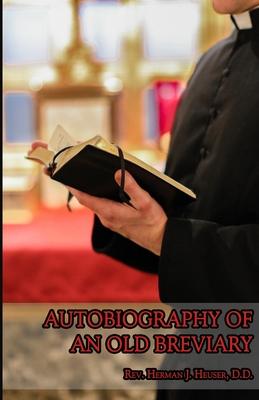A book is a book, and a very good thing, for all the wisdom and knowledge that makes up its contents. Books are common, everyday tools of leisure, education, and prayer; but not every book is a common thing - the Holy Bible is certainly an extraordinary one; and so too the Breviary of the Catholic priest is a very great book, having its roots in Holy Scripture itself. The breviary is the lifetime companion of the priest. It is his first act in the morning to open its pages and begin the day with prayer. It is his last act in the evening, to finish the day's prescribed reading and prayers from it. We may hear priestly conversation on the subject of the breviary, but did you ever wonder what a breviary, may reflect about itself?
Chances are that no, not many have sat and contemplated what the life of a breviary might have held; and this is why The Autobiography of an Old Breviary is an interesting speculative read; and the author makes it quite entertaining. To educate and inspire the reader, Rev. Herman J. Heuser amusingly writes in the first person the "character" of a Totum Roman Breviary, or complete breviary. This character is high-minded, being a Totum and not just an abbreviated prayer book, and begins with a complaint at having been shelved at assumedly nearing the end of its life. "Sometimes," says the Totum, "I have been in the hands of clerics who just treated me as if I were nothing but a common prayer-book, or a school manual which one wants to get through with as quickly as possible. But the professor knew better." The professor here is the Totum's inseparable companion, the Padre. Likening a priest and breviary to be a couple, working through the hardships of life together, much of the complaint of the Totum is that it is being treated ill compared to its high value, and set aside much as a wife might complain about her husband for being preoccupied or set aside for other persons.
The "Voice" of the Breviary speaks more than the story would relate, which is a pleasant read to say the least. Yet it goes further to uncover the deep reverence one must hold for the Roman Breviary itself, and its relationship with the priest, and indeed all the faithful. The author states in the introduction that the main purpose for the title is the encouragement and benefit of the priest, who by reading will be inspired with a greater devotion and love for his duty toward the Divine Office.
The book does well to detail the Hebrew origins of the Catholic liturgy, and spends a good deal of time doing so. It is a very exact and well-referenced study, relating the psalms by name and their use in both the Hebrew worship and the Catholic, and explaining their fittingness and meaning of use.
Autobiography of an Old Breviary is a cherished read, once begun. In the process of reading this title, the reader gains:
- A complete history of the Roman Breviary
- An Apologia for the Faith, Priesthood, and Catholic interpretation of the Bible
- In-depth detail of the linguistics of the Church
- An excellent explanation of the Church's liturgy and culture through the Kalendorium
- A brief instruction on how to follow the Breviary with description of its parts
- A greater devotion in the recitation of the breviary
